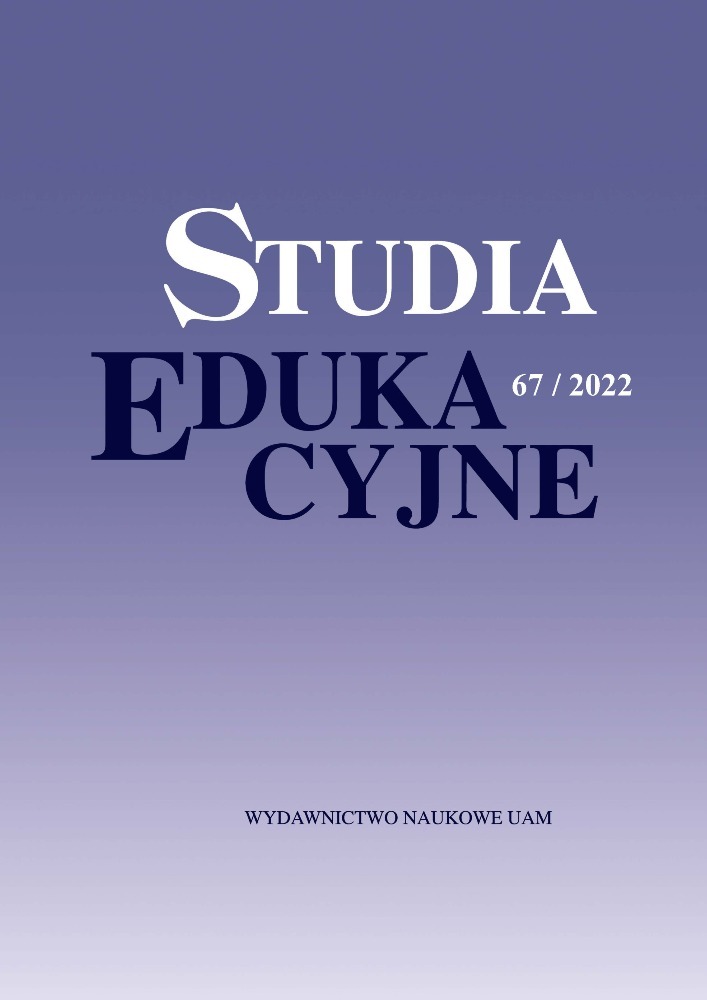Abstrakt
The article attempts to systematize selected concepts of creativity in the field of pedagogical research. Researchers undertake various studies in each area of study due to many aspects, among others, the ambiguity and multidimensionality of the concept of creativity. The paper presents selected approaches to defining creativity and reviews theories concerning psycho-pedagogical aspects of the structure of the creative process.
Bibliografia
Abraham, F.D. (2007). Cyborgs, cyberspace, cybersexuality: The evolution of everyday creativity. In: R. Richards, (Ed.), Everyday creativity and new views of human nature. Psychological, social, and spiritual perspectives. Washington: American Psychological Association, 241- 259 DOI: https://doi.org/10.1037/11595-007
Amabile, T.M. (1993). What Does a Theory of Creativity Require?. Psychological Inquiry, 4, 3, 179-181 DOI: https://doi.org/10.1207/s15327965pli0403_2
Brown, M. (2012). John Dewey’s Logic of Science. HOPOS: The Journal of the International Society for the History of Philosophy of Science, 2, 258-306 DOI: https://doi.org/10.1086/666843
Ferrari, A., Cachia, R., Punie, Y. (2009). Innovation and Creativity in Education and Training in the EU Member States: Fostering Creative Learning and Supporting Innovative Teaching. Literature review on Innovation and Creativity in E&T in the EU Member States (ICEAC). Luxembourg: JRC European Commission and IPTS
Guilford, J.P. (1968). Creativity, intelligence and their educational implications. San Diego: CA: EDITS/Knapp
Kabat-Szymaś, M. (2001). Twórcza, refleksyjna aktywność nauczyciela. Poznań: Wydawnictwo Naukowe Polskiego Towarzystwa Pedagogicznego, Oddział w Poznaniu
Kaufman, J.C. (2011). Kreatywność. Warszawa: Wydawnictwo APS
Kozielecki, J. (1992). Myślenie i rozwiązywanie problemów. W: T. Tomaszewski (red.), Psycho- logia ogólna. Warszawa: Wydawnictwo Naukowe PWN
Krauze-Sikorska, H. (2006). Edukacja przez sztukę: o edukacyjnych wartościach artystycznej twórczości dziecka. Poznań: Wydawnictwo Naukowe UAM
Nęcka, E. (1995). Proces twórczy i jego ograniczenia. Kraków: Oficyna Wydawnicza Impuls Nęcka, E. (2012). Psychologia twórczości. Sopot: Gdańskie Wydawnictwo Psychologiczne Pilch, T., Bauman, T. (2010). Zasady badań pedagogicznych. Strategie ilościowe i jakościowe. Warszawa: Wydawnictwo Akademickie Żak
Plucker, J.A., Beghetto, R.A., Dow, G.T. (2004). Why isn’t creativity more important to educational psychologists? Potentials, pitfalls, and future directions in creativity research. Educational Psychologist, 39, 83-96 DOI: https://doi.org/10.1207/s15326985ep3902_1
Popek, S. (1988). Zdolności i uzdolnienia twórcze – podstawy teoretyczne. W: S. Popek (red.), Aktywność twórcza dzieci i młodzieży. Warszawa: Wydawnictwa Szkolne i Pedagogiczne Popper, K.R. (1999). Droga do wiedzy. Domysły i refutacje. Warszawa: Wydawnictwo Naukowe PWN
Runco, M.A. (2003). Education for Creative Potential. Scandinavian Journal of Educational Research, 47, 3, 317-324 DOI: https://doi.org/10.1080/00313830308598
Runco, M.A. (2007). To understand is to create: An epistemological perspective on human nature and personal creativity. In: R. Richards (Ed.), Everyday creativity and new views of human nature. Psychological, social, and spiritual perspectives. Washington: American Psychological Association, 91-107 DOI: https://doi.org/10.1037/11595-004
Runco, M.A., Chand, I. (1995). Cognition and Creativity. Educational Psychology Review, 7, 3, 243-267 DOI: https://doi.org/10.1007/BF02213373
Ruth, R. (2007). Twelve potential benefits of living more creatively. In: R. Richards (Ed.), Everyday creativity and new views of human nature: Psychological, social, and spiritual perspectives. Washington: American Psychological Association, 289-319 DOI: https://doi.org/10.1037/11595-009
Sawyer, R.K. (2012). Explaining creativity: The science of human innovation. New York: Oxford University Press
Schulz, R. (1990). Twórczość – społeczne aspekty zjawiska. Warszawa: Wydawnictwo Naukowe PWN
Sternberg, R.J. (2001). Psychologia poznawcza. Warszawa: Wydawnictwa Szkolne i Pedagogiczne
Sternberg, R.J., Lubart, T.I. (1999). The concept of creativity: Prospects and paradigms. In: DOI: https://doi.org/10.1017/CBO9780511807916.003
R.J. Sternberg (Ed.), Handbook of creativity. New York: Cambridge University Press, 3-15
Strzałecki, W. (1969). Wybrane zagadnienia psychologii twórczości. Warszawa: Państwowe Wydawnictwo Naukowe
Sundararajan, L., Averill, J.R. (2007). Creativity in the everyday: culture, self and emotions. In: DOI: https://doi.org/10.1037/e676892007-001
R. Richards (Ed.), Everyday creativity and new views of human nature. Psychological, social, and spiritual perspectives. Washington: American Psychological Association, 195-220
Szmidt, K.J. (2013). Pedagogika twórczości. Sopot: Gdańskie Wydawnictwo Psychologiczne Szymczak, M. (red.), (1998). Słownik języka polskiego, t. I-III, Warszawa: Wydawnictwo Naukowe PWN
Trojanowska-Kaczmarska, A. (1971). Dziecko i twórczość. Wrocław: Wydawnictwo PAN
Urban, K.K. (2003). Toward a componential model of creativity. In: D. Ambrose, L.M. Cohen,
A.J. Tannenbaum (Eds.), Creative intelligence. Toward theoretic integration. New Jersey: Hampton Press, Cresskill, 81-112
Uszyńska-Jarmoc, J. (2003). Twórcza aktywność dziecka: teoria, rzeczywistość, perspektywy rozwoju. Białystok: Wydawnictwo Trans Humana
Zimbardo, P.G., Johnson, R.L., McCann, V. (2010). Psychologia. Kluczowe koncepcje. Warszawa: Wydawnictwo Naukowe PWN
Licencja
Prawa autorskie (c) 2022 Michalina Kasprzak

Utwór dostępny jest na licencji Creative Commons Uznanie autorstwa 4.0 Międzynarodowe.

